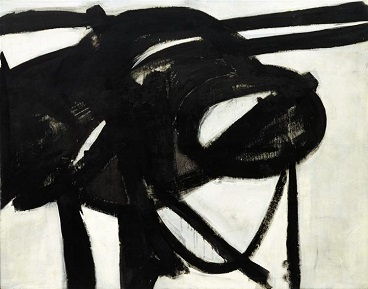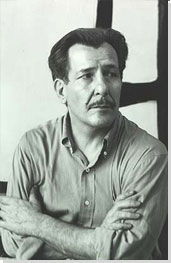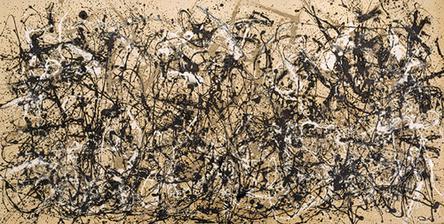Summary of Franz Kline
American Abstract Expressionist Franz Kline is best known for large black and white paintings bearing abstract motifs set down with strident confidence. He started out as a realist with a fluent style that he perfected during an academic training that encouraged him to admire Old Masters such as Rembrandt. But after settling in New York and meeting Willem de Kooning, he began to evolve his signature abstract approach. By the end of his life he had achieved immense international recognition, and his unusual approach to gestural abstraction was beginning to influence the ideas of many Minimalists.
Accomplishments
- Franz Kline is most famous for his black and white abstractions, which have been likened variously to New York's cityscape, the landscape of his childhood home in rural Pennsylvania, and Japanese calligraphy.
- The poet and curator Frank O'Hara saw Kline as the quintessential 'action painter', and Kline's black and white paintings certainly helped establish gestural abstraction as an important tendency within Abstract Expressionism. Yet Kline saw his method less as a means to express himself than as a way to create a physical engagement with the viewer.
- The powerful forms of his motifs, and their impression of velocity, were intended to translate into an experience of structure and presence which the viewer could almost palpably feel. Along with De Kooning and Pollock, Kline was one of the examplary artists heralded in Harold Rosenberg's definition of Action Painting.
- Kline's reluctance to attribute hidden meanings to his pictures was important in recommending his work to a later generation of Minimalist sculptors such as Donald Judd and Richard Serra.
Important Art by Franz Kline
Painting No. 7
Unlike his friends Pollock and de Kooning, Kline never experimented with figurative elements in his mature work. Painting No.7 is a fine example of his black and white pictures. The rigid geometry of broad black lines defines the composition, perhaps manifesting his reconsideration of the iconic paintings of squares by Kazimir Malevich.
Oil on canvas - The Solomon R. Guggenheim Museum, New York

Chief
Critics' comments on the pictures included in Kline's breakthrough show of 1950 set the pattern for later reviews with their variety of analogies. Chief was the name of a locomotive Kline remembered from his childhood, and it's possible to read the image as a sensory reminiscence of its power, sound and steaming engine. Some also believed that the artist's obsession with black was connected to his childhood spent in a coal-mining community dominated by heavy industry. Many have since noted, however, that the forms in these early abstractions seem to have evolved from Kline's drawings of his wife Elizabeth. He made numerous sketches of her sitting in a rocking chair in the years when she began to succumb to mental illness; the circular forms in Chief bear comparison with the blank circles representing her face in the drawings.
Oil on canvas - The Museum of Modern Art, New York
Four Square
Four Square is another example of Kline's experimentation with angular compositions. Although apparently structured in its compositional rigidness, Four Square is a fine example of his gestural approach to painting. The viewer is led to ponder the canvas, seeing as either a close-up of a linguistic symbol or, perhaps, a set of open windows. In this work Kline is also attempting to construct a three-dimensional abstract composition, whereas most of the Abstract Expressionists preferred the two- dimensional treatment of the pictorial surface. Kline achieves the visual effect of depth through energetic juxtapositions of vertical and horizontal lines and their diagonal overlapping.
Oil on canvas - The National Gallery of Art, Washington DC
Meryon
Meryon has a strong architectonic sense in its composition. The inspiration was possibly an engraving of a clock tower by the 19th-century French artist Charles Meryon. Again, Kline represents not the object itself, but his vision of it. Seemingly spontaneous in its arrangement, this composition was conceived through a number of preliminary studies, shedding a new light on the nature of his gestural technique.
Oil on canvas - Collection of the Tate, United Kingdom
Black Reflection
Black Reflection is an example of Kline's early attempts at introducing color back into his works. The treatment of color in this composition could be related to the contemporary paintings of Willem de Kooning and Hans Hofmann. The focal point of this picture is the black shape that Kline previously employed in the Untitled composition of 1954. This fact further attests to the careful consideration the Action Painting artists devoted to the pictorial forms in their compositions.
Oil on canvas - The Metropolitan Museum of Art, New York.
Probst I
Probst I refers to Jack Probst, a fellow artist who lived near Kline in Greenwich Village. At first glance, this composition is typical of his black and white work. However, more colors are present on this canvas. There are dabs of yellow and pale salmon that illuminate the massiveness of black twisted shapes, creating warm luminous effects. Probst I is an example of Kline's late work where he returned to employing a wider palette.
Oil on canvas - The Museum of Fine Arts, Boston.
Biography of Franz Kline
Childhood
Franz Kline was born and raised in Wilkes-Barre, Pennsylvania, a small coal-mining community that offered few opportunities for artistic development. His childhood was marred by a complicated relationship with his parents. His father, a saloon keeper, committed suicide in 1917, when Kline was only seven years old. His mother later remarried and sent her son to an institution for fatherless boys, which the artist referred to as "the orphanage."
Early Training
Determined to make his own way, Kline worked as a cartoonist for his high school newspaper and managed to escape his small town to attend Boston University's School of Art, between 1931 and 1935. Boston offered him a wealth of opportunities: not only did his instructors help familiarize him with modern art, but he also learnt much from the city's private and public collections. After leaving, he studied briefly at the Art Students League in New York. He then went to England where he enrolled in the Heatherly's School of Art in London. It was there that he met his future wife, Elizabeth V. Parsons, a former ballet dancer who was working as an artist's model at the school. She returned with Kline to New York in 1938 but would later suffer a mental breakdown and spend time in mental institutions.
Mature Period
The first few years back in New York proved difficult for Kline. He was forced to take odd jobs: he painted murals in bars and sold illustrations to magazines. At this point, his work was shaped by his love of Old Masters such as Rembrandt, but in 1943 he met Willem de Kooning and began to frequent the Cedar Bar, where he met Jackson Pollock and Philip Guston. Around 1947, under the influence of de Kooning, he also began to abandon figuration and experiment on a large scale with a gestural, abstract technique. He had already began to explore an austere black and white palette in a series of ink on paper sketches, but now he brought the technique to canvases and employed house-painting brushes to create broad strokes of black criss-crossing white canvases. In part he was inspired by de Kooning's black and white paintings of 1946-49, and - although the story is apocryphal - it is said that de Kooning also inspired him to scale up the work, after he encouraged him to examine it using an enlarger. "A four by five inch black drawing of a rocking chair," Kline recalled, "...loomed in gigantic black strokes which eradicated any image, the strokes expanding as entities in themselves, unrelated to any entity but that of their own existence." The pictures, which resulted from this revelation, were first exhibited at the Charles Egan Gallery in New York in 1950, a show that established Kline's reputation.
Critics have long debated whether Kline's black and white paintings were inspired by Japanese calligraphy. The suggestion first surfaced in reviews of his breakthrough show of 1950. However, the artist denied it, claiming that his inspirations came from unconscious sources. When asked to explain the meaning of his work, he refused, saying that he wanted the viewers to feel the effects of the composition unhindered by suggestion. Instead, he emphasized the non-symbolic character of the work, and what he called "painting experience." He was supported in this by critics such as Clement Greenberg, who focused on the importance of abstract form in art, and sidelined discussions of sources or content. Kline also put a distance between himself and contemporaries such as Mark Rothko and Barnett Newman, whose art expressed an urge to transcendence. And, although his gestural approach might seem to place him close to de Kooning, Kline was less interested in wild expression than in the isolated gesture itself.
Late Period and Death
By 1955 Kline was experimenting with color once again - using planes painted in different hues to evoke a more complex sense of space. His style also became looser, and by the early 1960s, in works such as Red Painting (1961), some of his pictures were almost monochromatic. By this stage, Kline's reputation was secure as a leading Abstract Expressionist. He was exhibiting continuously both in the U.S.A. and abroad, and was selected to show at the Venice Biennale in 1960, along with Hans Hofmann, Philip Guston and Theodore Roszac. In 1961, his works were also included in "American Vanguard", an exhibition organized by the United States Information Agency, and which toured countries throughout Europe. Such exhibitions have since come to be seen as an important facet of the American government's efforts to advance itself as a guardian of free expression in the midst of the Cold War. He died unexpectedly of heart failure on May 13, 1962, aged only fifty-two.
The Legacy of Franz Kline
Although Kline's death received much attention in the press, his fame declined in subsequent years and his work was not seriously revisited until the art market boom of the late 1980s. However, a new generation of Minimalists found much of interest in his work. They rejected the heroics of his gestures, and their aura of lofty nobility, but they were attracted by the way the viewer could feel energized by the architectonic forms of his motifs. What to some critics seemed like references to architecture then became almost real built surfaces in the work of artists like Donald Judd and Richard Serra.
Influences and Connections

-
![Expressionism]() Expressionism
Expressionism ![Japanese Calligraphy]() Japanese Calligraphy
Japanese Calligraphy
-
![Mark Rothko]() Mark Rothko
Mark Rothko -
![Andrew Wyeth]() Andrew Wyeth
Andrew Wyeth ![Robert Creeley]() Robert Creeley
Robert Creeley![Allen Ginsberg]() Allen Ginsberg
Allen Ginsberg
 Ask The Art Story AI
Ask The Art Story AI
































